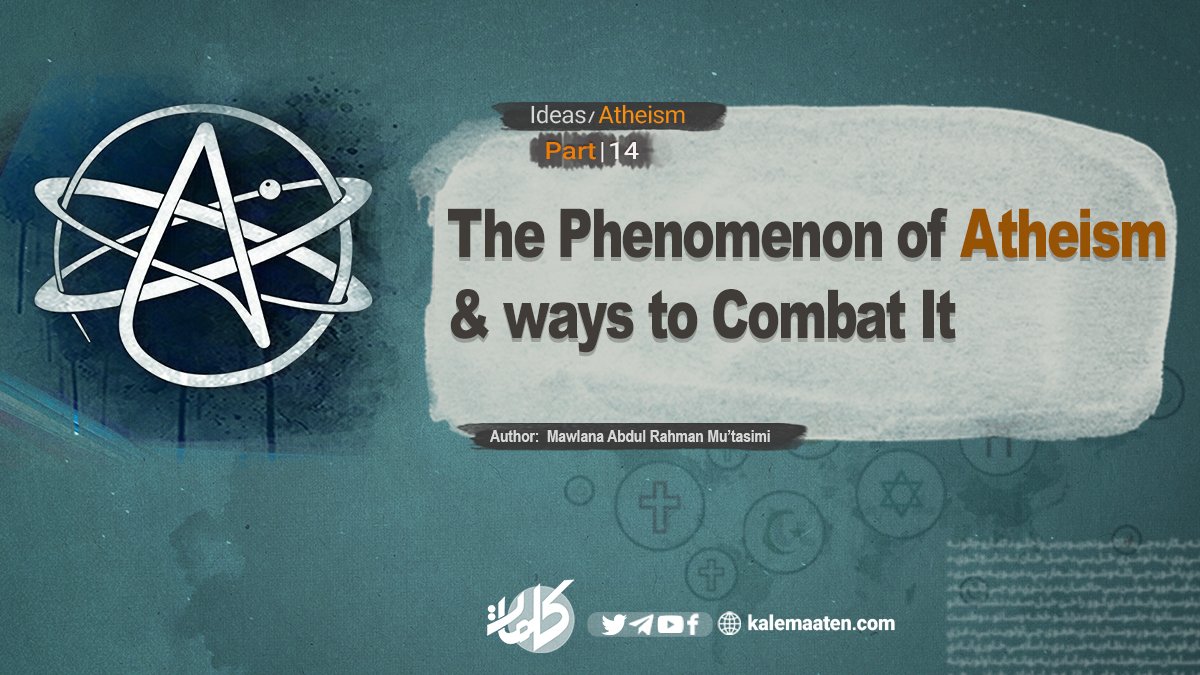
Author: Mawlana Abdul Rahman Mu'tasimi
The Phenomenon of Atheism and Ways to Combat It (Part 14)
Fourth: Hedonism
A faith-based worldview provides a moral commitment that restrains individuals from many indulgences, desires, and carnal cravings. A believer’s faith in Allah Almighty and the Day of Judgment instills a fear of accountability and divine punishment for sins and transgressions.
«فَأَمَّا مَنْ طَغَى (۳۷) وَآثَرَ الْحَيَاةَ الدُّنْيَا (۳۸) فَإِنَّ الْجَحِيمَ هِيَ الْمَأْوَى (۳۹) وَأَمَّا مَنْ خَافَ مَقَامَ رَبِّهِ وَنَهَى النَّفْسَ عَنِ الْهَوَى (۴۰) فَإِنَّ الْجَنَّةَ هِيَ الْمَأْوَى(۴۱)». Translation: “But as for he who transgressed – and preferred the lowly life of this world – then his refuge will be the Fire; and as for he who feared standing before his Lord and restrained his soul from [its] desire – then his refuge will be Paradise.” [An-Nazi’at: 37 – 41]
Atheists, on the other hand, believe in nothing; they feel liberated from all constraints and perceive no barriers to their pursuit of pleasure, enjoyment, and the fulfillment of their carnal desires. Hedonistic and self-centered individuals often find their purpose and goals within atheism, making hedonism a factor contributing to atheism. Experts and analysts of atheism, including Pasquini, consider hedonism one of the most significant driving forces behind the rise of atheism.
Pasquini argues that one of the primary factors steering individuals toward atheism is the extraordinary appeal of hedonism found in the atheistic worldview. For those who are practically atheistic—where God is disregarded—there is little difference in their lives compared to theoretical atheists. What holds significance for them is the sensual gratification derived from material hedonism within atheism, coupled with the difficulties and limitations that a faith-based worldview presents.
In essence, faith necessitates a fundamental shift in one’s perspective and lifestyle; faith reveals itself in ultimate choices and moral selection, often overshadowing and curtailing self-centeredness, selfishness, and hedonism.
Moral commitments represent a critical area that atheists frequently overlook, and surprisingly, even intellectuals, thinkers, and atheist philosophers often neglect its significance. Pasquini, employing his analytical method, seeks examples of moral corruption and weakness among renowned figures of the new atheism. This reveals that unrestricted sexual relations, numerous sexual partners, and encounters motivated solely by sexual pleasure are prevalent among atheists, even those labeled as intellectuals and thinkers.
The issue of homosexuality has evolved into a highly contentious and prominent topic in today’s world, to the point of becoming a political tool. Many hedonistic atheists actively advocate for homosexuality and view belief in God as an obstacle to fulfilling their sexual wants. Notably, a substantial number of lesbians, gays, and transgender individuals identify as atheists; this is because atheism dispenses with moral constraints, allowing them to adopt lifestyles that distinguish them and garner attention while dismissing moral limits and pursuing enjoyment.
Sheikh Abdul Rahman bin Abdul Khaliq elaborates on this point, stating that material knowledge has opened vast opportunities for comfort, luxury, enjoyment, and life’s pleasures. The availability of advanced means of transportation such as motorcycles, airplanes, and trains, along with communication technologies, entertainment options, fine dining, stylish clothing, and an astonishing array of indulgences have unveiled unprecedented avenues for enjoying life and succumbing to lusts and pleasures.
However, religious teachings generally prohibit extravagance and advocate for moderation and balance. They forbid the consumption of what is unlawful, such as alcohol, adultery, and nudity. Those unfamiliar with the deeper meanings of religious teachings often perceive these prohibitions as constraints on their freedom and limitations on their pleasures and desires.
Consequently, they express aversion and resentment toward religion and those who remind them of the afterlife, cautioning them about the punishment of Hellfire and offering hope for Paradise. As a result, alienation from religious beliefs has intensified, and the spread of atheism and innovations has flourished.
Continues…


